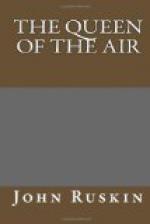yourself; and when you are bettered by them, it shall
be partly with a general acceptance of their influence,
so constant and subtile that you shall be no more
conscious of it than of the healthy digestion of food;
and partly by a gift of unexpected truth, which you
shall only find by slow mining for it,—which
is withheld on purpose, and close-locked, that you
may not get it till you have forged the key of it
in a furnace of your own heating. And this withholding
of their meaning is continual, and confessed, in the
great poets. Thus Pindar says of himself:
“There is many an arrow in my quiver, full of
speech to the wise, but, for the many, they need interpreters.”
And neither Pindar, nor AEschylus, nor Hesiod, nor
Homer, nor any of the greater poets or teachers of
any nation or time, ever spoke but with intentional
reservation; nay, beyond this, there is often a meaning
which they themselves cannot interpert [sic],—which
it may be for ages long after them to intrepert [sic],—in
what they said, so far as it recorded true imaginative
vision. For all the greatest myths have been
seen by the men who tell them, involuntarily and passively,—seen
by them with as great distinctness (and in some respects,
though not in all, under conditions as far beyond
the control of their will) as a dream sent to any of
us by night when we dream clearest; and it is this
veracity of vision that could not be refused, and
of moral that could not be foreseen, which in modern
historical inquiry has been left wholly out of account;
being indeed the thing which no merely historical
investigator can understand, or even believe; for
it belongs exclusively to the creative or artistic
group of men, and can only be interpreted by those
of their race, who themselves in some measure also
see visions and dream dreams.
* Note, once for all, that unless when there is question
about some particular expression, I never translate
literally, but give the real force of what is said,
as I best can, freely.
So that you may obtain a more truthful idea of the
nature of Greek religion and legend from the poems
of Keats, and the nearly as beautiful, and, in general
grasp of subject, far more powerful, recent work of
Morris, than from frigid scholarship, however extensive.
Not that the poet’s impressions or renderings
of things are wholly true, but their truth is vital,
not formal. They are like sketches from the life
by Reynolds or Gainsborough, which may be demonstrably
inaccurate or imaginary in many traits, and indistinct
in others, yet will be in the deepest sense like,
and true; while the work of historical analysis is
too often weak with loss, through the very labor of
its miniature touches, or useless in clumsy and vapid
veracity of externals, and complacent security of
having done all that is required for the portrait,
when it has measured the breadth of the forehead and
the length of the nose.




